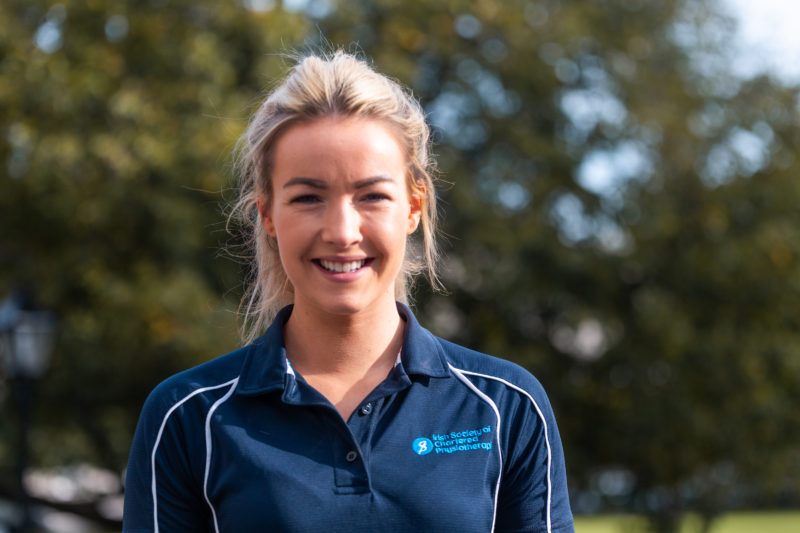Anita O’Brien had only planned to spend a year with Dublin Ladies Gaelic Football. Three All-Ireland-winning seasons later, however, she remains the head physio with the side – and has no intention of packing it in any time soon.
Watching the team you have helped get through everything from pulled hamstrings to broken bones walk one by one up the Hogan Stand to pick up Ireland’s most coveted trophy must be a satisfying feeling – and a hard one to pull yourself away from.
Despite being an integral part of the team’s support system on and off the pitch, even O’Brien could not have predicted the success of the past few years: “Each year has been a stepping-stone and a building-stone. They were fortunate enough to get three in a row this year, so it’s been fantastic.”
Now at a flashpoint in her career, she has time to reflect on her path to success with Dublin. She tells me about her journey: “As I was growing up, I wanted to do something along the medical field, but didn’t quite know it was physio.”
Growing up she always had dreams of attending Trinity, but it was her own experience with sport and physiotherapy which gave her the inspiration to pursue her current career. O’Brien tells me that she grew up in a sporting environment – throughout her adolescence and time at Trinity, she played GAA, hockey and rugby.
Each year has been a stepping-stone and a building-stone. They were fortunate enough to get three in a row this year, so it’s been fantastic
Between her passion for sport and her first-hand insight into physiotherapy, O’Brien began to consider devoting her career to helping people get over their bodily ailments: “Throughout playing sport over the years, when I was a teenager I had a couple of injuries. Nothing too serious, but ended up going to the physio a few times.”
O’Brien even had a brief stint at Dublin University Football Club (DUFC), working alongside sporting medical staff.
“I think everyone in college has moments where they think, ‘Oh, is this for me’, but I have to say, overall, I was very happy with my time here and my career choice”, she says, looking back.
O’Brien’s passion for her work is tangible, and given her long working days, enthusiasm for the cause is a necessity. A regular day for her would see O’Brien starting work at around 8.30am. After conducting morning, afternoon and evening clinics, she finishes after 6pm. Her day doesn’t end there – her commitments to various sports teams in Dublin see her travelling to training sessions across the county. Most nights, she doesn’t get home until 9.30pm.
Weekends don’t always offer much of a chance to relax either: “Saturday and Sunday would be mostly matches. Obviously when I’m with Dublin they could be anywhere in the country. Rugby tends to be more Dublin-based, but you would get a few that would be down the country as well.”
Despite the time commitments, O’Brien never sees it as a chore: “Obviously they take up quite a bit of time, travelling to and from, but it’s really enjoyable, so I love it.”
Saturday and Sunday would be mostly matches. Obviously when I’m with Dublin they could be anywhere in the country
Along with successes on the pitch with Dublin, O’Brien also reached a special personal milestone in 2019. When asked about her long-term targets, she speaks with pride about how this year, she achieved her dream of opening up her own clinic at Castleknock Lawn Tennis Club: “My five-year plan from graduating was to open up a long-term clinic, and that was what I did this year, so at the moment my focus is on developing that. I’m really happy with where it’s going.”
With several years experience working with top-level athletes, and now operating her own clinic, O’Brien knows the perils of injury and the effect it can have on players. Apart from the obvious physical toll, the psychological impact of an injury can often complicate the rehabilitation process. O’Brien makes sure to include mental preparation in her programme for athletes looking to make a successful return to the game.
“Fear about returning to play is a huge thing, particularly the bigger the injury, so if you’ve been out for six weeks with an injury, obviously your confidence is going to be knocked a little bit”, she says.
“As part of the rehab you will be doing sport-specific drills for whatever your sport is, mimicking what you would be doing. Once you’ve done a couple of sessions on that your confidence will grow and you’ll be more likely to go: ‘Okay, I’m ready for this.’”
Amateur athletes find it particularly tough to shake injuries. Unlike professional athletes, who can dedicate their time to recovering and getting back to full fitness, amatuer players face the reality of their working lives outside of sport.
Given the time constraints, O’Brien is pragmatic in her response to this problem: “They don’t have as much time as professional athletes because they are working, but they prioritise it. Like anything in life, if it’s important, its prioritised.”
With personal and collective successes collated in an impressive CV, O’Brien is determined to keep moving forward: “At the moment, I’m probably not going to leave the clinic. I need to develop that here, and we will see what five or 10 years brings”
What those five or 10 years might hold, she doesn’t know. But despite her achievements, she’s still only looking to the future – perhaps a tendency she has picked up from the winning mentality systemic in Dublin GAA.
With several years experience working with top-level athletes, O’Brien knows the perils of injury and the effect it can have on players. Apart from the obvious physical toll, the psychological impact of an injury can often complicate the rehabilitation process.







